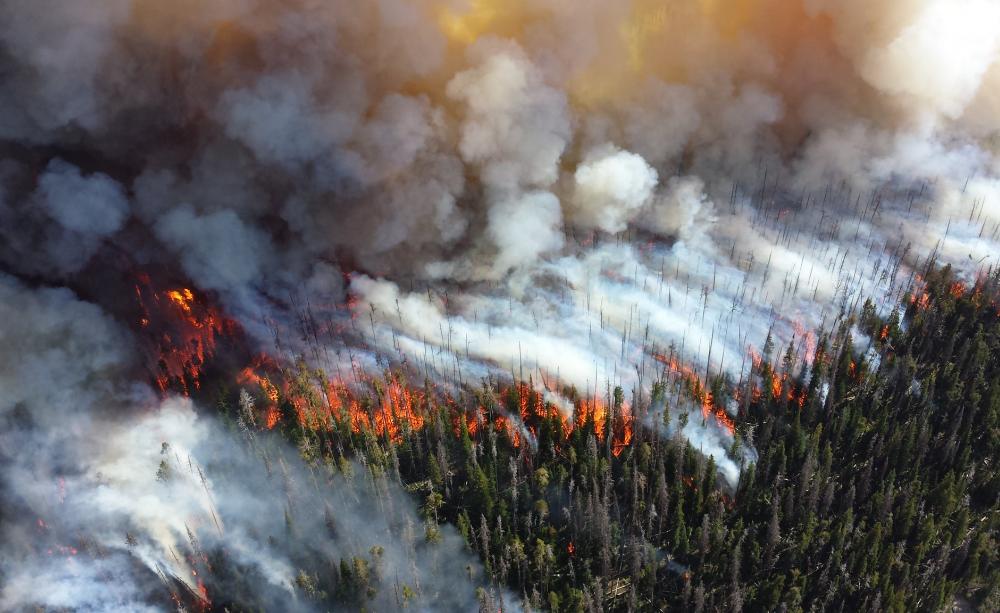-
I'm a pessimist. I sometimes doubt that human existence is a good thing. And I generally doubt that societies have the capacity to tackle anthropogenic global heating before its effects become truly horrendous.
My pessimism, I’m sorry to say, can be tinged with misanthropy. I reflect more than is healthy on the human capacity (including my own) for cruelty, complacency, selfishness, and bigotry. The political situation across the world, including where I live in the UK, has done nothing to temper this tendency.
One might think, therefore, that I would be a receptive reader of Jonathan Franzen’s recent essay in The New Yorker - “What if we stopped pretending?” - in which he argues that catastrophic climate change is inevitable. But I’m not. First, the article seems flawed in its understanding of the situation. Secondly, it’s over-confident. Like Franzen, I run pessimistic models in my head. Unlike him, I don't assume that they are reliable guides to reality.
Climate apocalypse
I find a weird pleasure in reading pessimistic takes like Franzen’s, and the more insightful and nuanced work of Roy Scranton. But I’m aware that my understanding of global heating is very limited. It’s also conditioned by my identity as a depressive middle-aged white man with little scientific training, who lives in a wealthy country that has so far been relatively sheltered from climate change. To someone with my privilege, climate apocalypse has so far been spectator sport, even if I fear that at some point I will end up in the arena.
Franzen’s argument is that little or no progress has been made to address global heating, although the science has been clear for at least thirty years. He sees expressions of hope that the problem can be "solved" as a denial of reality. He therefore takes issue with “progressive” rhetoric (i.e. around the Green New Deal) as well as the outright denialism of some on the right. If the global mean temperature rises by more than two degrees, he suggests, various feedback loops will cause climate change to spiral out of control.
Franzen sees no hope that this target can be met, given human nature and global political and economic structures. He claims: “In the long run, it probably makes no difference how badly we overshoot two degrees; once the point of no return is passed, the world will become self-transforming”.
He accepts that cutting emissions is worthwhile if it slows down global heating. However, he also sees false hope as harmful. His concern is that it gives too much emphasis to mitigation rather than adaptation, and distracts from more soluble ecological problems. He also points out that large-scale renewable energy initiatives can destroy ecosystems.
His conclusion that we should focus on “smaller, more local battles” – in his case supporting a farm that offers opportunities for homeless people – as a way of hedging against the future is unsurprising. An emphasis on local rather than global concerns is often to be found in the work of other “doomist” writers such as Paul Kingsnorth. It is also has a long history in pessimistic thought, going back at least as far as Voltaire’s conclusion in Candide that we are best off cultivating our own gardens.
Climate de-nihilism
Franzen’s article has not been well received by climate scientists and activists. It has been attacked on several grounds including scientific misunderstandings, political confusion, and an irritating lack of self-awareness. (A useful summary of criticisms can be found here.)
Even with my limited knowledge of the science, I am confident that Franzen is wrong that a mean global temperature rise of two degrees (although clearly very bad indeed) constitutes a "point of no return".
His dichotomy between adaptation and mitigation also seems false, as does his attempt to separate climate change from other pressing ecological concerns.
Some of the rhetoric used to attack Franzen is unhelpful, though. As pointed out by @libshipwreck on Twitter: “Framing those who are very scared about climate change as “climate cowards” is a great way to ensure that people won’t honestly express their worries”. The problem is not that Franzen is pessimistic, but that he has been given a media platform not commensurate with his limited understanding of his subject.
The most powerful response that I have read, by Mary Annaïse Heglar, coins the phrase “climate de-nihilists” to describe people (generally white men) who, by preaching the gospel of doom, dangerously distract from the fact “that every slice of a degree matters. And right now, that means everything we do matters”.
Heglar also takes issue with the climate community’s “insistence on hope” and its “tone-policing”. For “both smack of the privilege wrought from the deluded belief that this world has ever been perfect and that, therefore, an imperfect version of it is not worth saving, or fighting for”.
As a humanities scholar, I feel ill equipped to face the climate emergency. But my training does at least help me to view with suspicion the absolutist pronouncements that make headlines and publishing deals. We should distrust mantras such as “tech will save us!”, “markets will save us!”, “socialism will save us!”, “planting trees will save us!”, and “we’re all doomed!”. The future will be messier.
The problem of "we"
In a measured response to Franzen, Kate Marvel argues that it is “the fact that we understand the potential driver of doom that changes it from a foregone conclusion to a choice, a terrible outcome in the universe of all possible futures”. On Twitter, Roy Scranton responded sceptically: “Well sure, but whose choice? Who has the power to make these changes?”
It’s a fair point. There’s no one in control of global carbon capitalism, which lumbers around like a blinded giant, crushing everything in its wake. Climate discourse often talks about “we” as if humanity was a unified agent, which is obviously far from the truth.
That’s not to say that things can’t change. As Genevieve Guenther has argued, “we” also occludes the varying degrees of complicity with and responsibility for the world’s fossil fuel addiction. I am highly sceptical that the powerful vested interests that keep the giant alive can be defeated. But I am also sceptical of my scepticism, aware that it has at least as much to do with my emotional makeup as it does with my partial understanding of a complex situation.
When "doomists" write about “we”, they often seem to mean people like themselves. (I probably do the same in this article; it’s hard to avoid.) It's highly likely that a privileged way of life, fuelled by high consumption and fossil fuels, is coming to an end. But this way of life has only ever been enjoyed by a minority of the global population, and by no means everyone even in the rich countries where it is most prevalent.
To confuse the end of that way of life with the apocalypse, or even the end of human species, seems (to put it kindly) parochial. It also speaks of a complacency arising from the fact that the people and countries the most responsible for global heating have been, to a large extent, the ones the most sheltered from its effects. This may not remain the case for ever.
Climate possibilities
My pessimism tells me that the worst predictions of David Wallace-Well’s The Uninhabitable Earth and Mark Lynas’s Six Degrees will come to pass. But I do not confuse pessimism with prophecy. And if anything is likely to hold back my misanthropic tendencies, it’s the remarkable efforts of people across the world to tackle global heating.
The climate crisis is not going to be solved. With a huge amount of effort, ingenuity, and luck, it might be possible to mitigate and adapt to its worst effects. I don’t see that we – individually and collectively, locally and globally, in fear or hope or rage or despair or whatever – have much to lose in making the attempt.
This Author
David Higgins is an associate professor in English Literature at the University of Leeds. His work focuses on British Romanticism and the environmental humanities. His most recent book, British Romanticism, Climate Change, and the Anthropocene: Writing Tambora (Palgrave, 2017).
Image: NPS Climate Change, Flickr.




